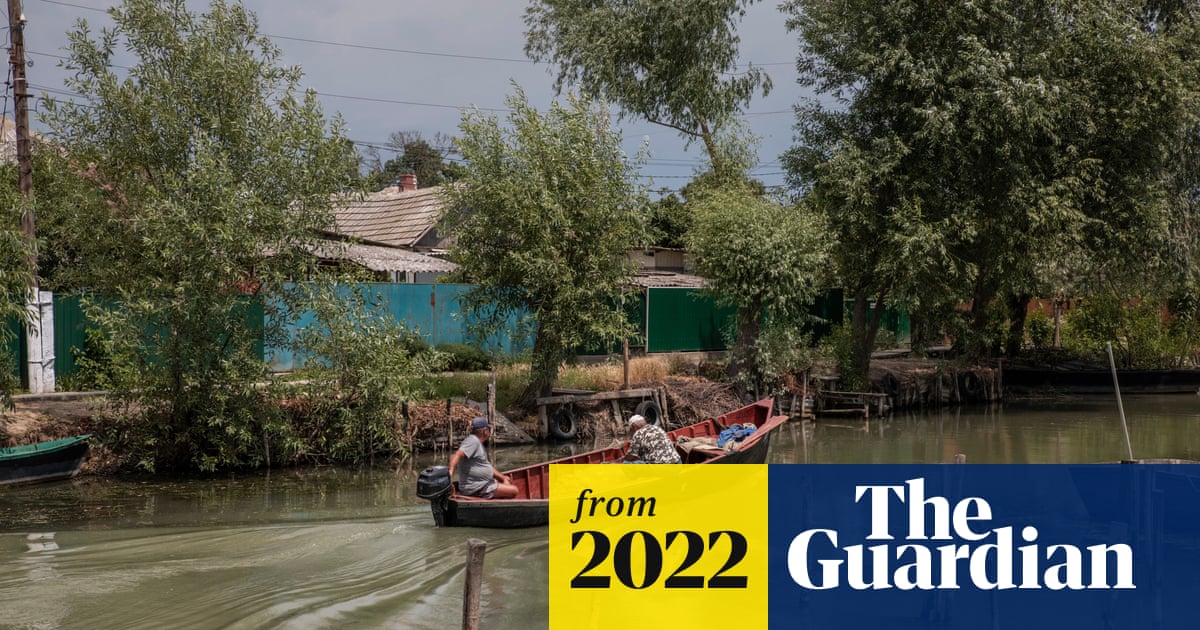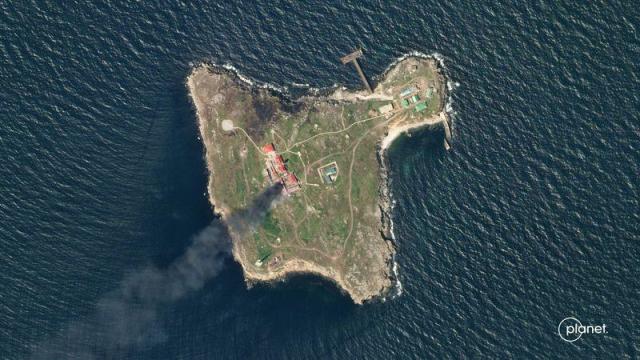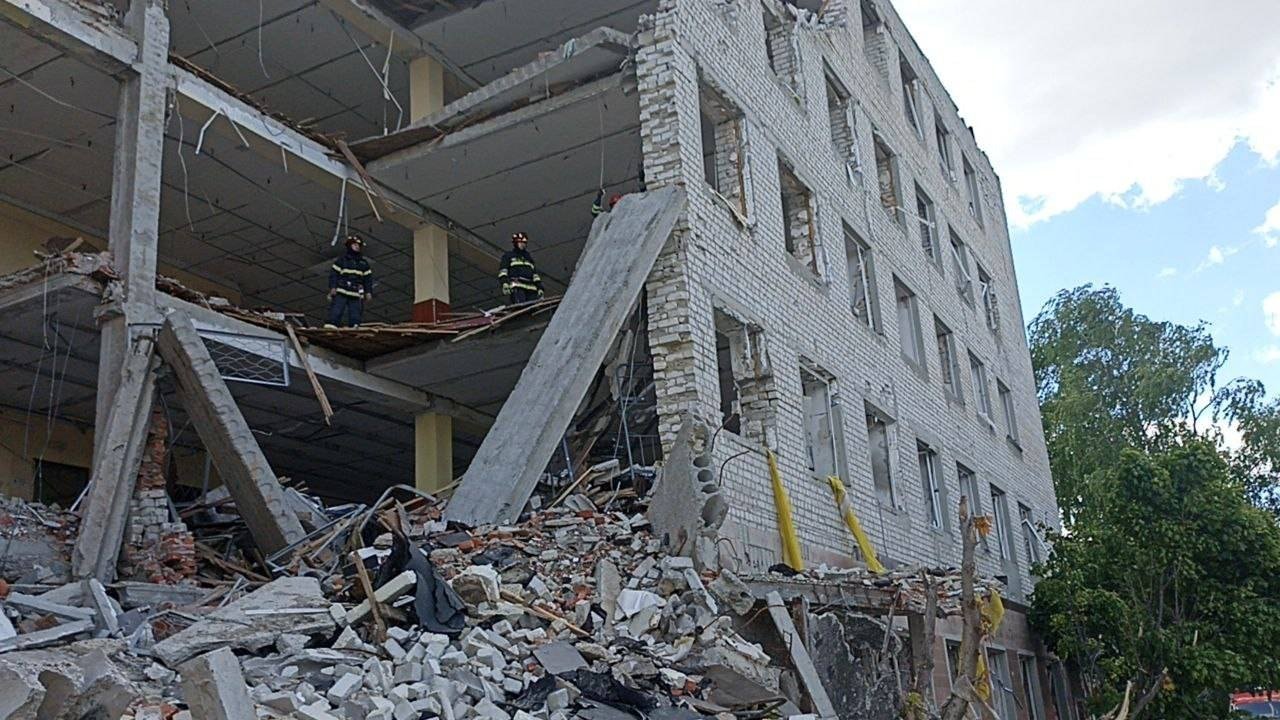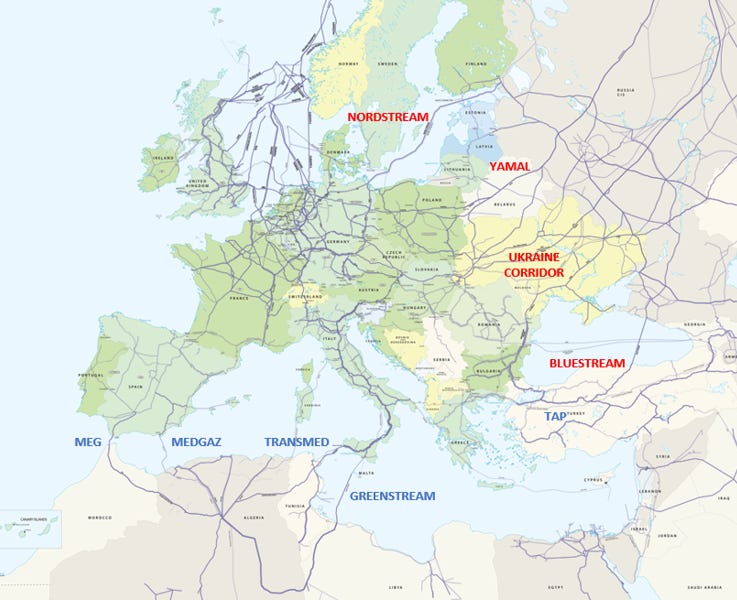Hmmm...for the other side of the story, try this: Lavrov scolds G7 leaders, Putin's speech signals the end of neoliberal world orderI hope this is successful.
A major set back like this might convince enough Russians that the war is futile, and it will achieve nothing.
Once Russia starts losing territory faster than they are gaining it, that might provide a rethink. I know this is optimistic, but it is the best hope for a quicker outcome.
Welcome to Tesla Motors Club
Discuss Tesla's Model S, Model 3, Model X, Model Y, Cybertruck, Roadster and More.
Register
Install the app
How to install the app on iOS
You can install our site as a web app on your iOS device by utilizing the Add to Home Screen feature in Safari. Please see this thread for more details on this.
Note: This feature may not be available in some browsers.
-
Want to remove ads? Register an account and login to see fewer ads, and become a Supporting Member to remove almost all ads.
You are using an out of date browser. It may not display this or other websites correctly.
You should upgrade or use an alternative browser.
You should upgrade or use an alternative browser.
Russia/Ukraine conflict
- Thread starter amolina
- Start date
petit_bateau
Active Member
Looks like HIMARs is widening its target set to include not just ammo dumps but also : C&C centres, S400 SAM sites, rail nodes, and troop concentrations. And if you keep an eye on the various information leaks from Kherson area there is very significant progress being made.


Ukraine Update: HIMARS rules the night, aka 'it's HIMARS'o'clock'
The first season of the Ukraine War was the assault on Kyiv, ending with Russia’s humiliating retreat. The second season was the Battle of Donbas, which ended on a cliff hanger with Russia taking Severodonetsk and Lysychansk (and with it, Luhansk...
www.dailykos.com
petit_bateau
Active Member
and on cueRe Ukraine grain export the main efforts that do not involve reopening seaports are 1) riverine traffic and 2) increased silo capacity at the border crossings. The link below is re 1) and I haven't seen a good account of 2). Changing rail gauges is not on the cards right now in Ukraine.

Ukraine restores Danube River ports in emergency effort to get grain out
Soviet-era ports being resuscitated but officials say only way to mitigate global hunger is to end Russia’s Black Sea blockadewww.theguardian.com

Due to the recapture of Snake Island, the passage of grain ships has reopened.
Due to the recapture of Snake Island, the passage of grain ships has reopened. - Economy
The mouth of the Sulina canal and the Reni riverport are both highlighted below. Access to the Sulina canal would appear to be possible almost entirely through Romanian (i.e. NATO) waters. Snake Island is that little dot offshore marked "Bile".
Attachments
I would like to believe this, but surely the Russians will adapt..
The Russians have been able to adapt in some areas, but have completely failed in others. They switched from attempting a fast maneuver warfare victory in the early going to brutal artillery barges on Ukrainian positions and towns followed by advances by poorly trained infantry and armor that takes objectives, but at a very steep price. On the other hand they haven't figured out that Russia can't just throw bodies at an objective until they succeed anymore. In previous wars Russia/the USSR had a large population they could sacrifice to get what they wanted. But Russia has had a low birth rate for 40 years and they lost half their population with the USSR breaking up. They don't have unlimited manpower any more.
Russia has been very slow to adapt to the cold reality they have a manpower shortage. This not just extends to their infantry shortage, but also to their logistics train. Western armies have a logistics train optimized to do as much as possible with as few people as possible. There are lots of labor saving equipment as well as packaging to that end. Russia still moves most of its cargo by getting a bunch of guys to lift and haul WW II style wooden crates with ammo. It's a time suck as well as diverting a bunch of people from other jobs just to get the truck unloaded.
Decentralization is another thing I think the Russians are going to struggle to adopt because their military and government is so centralized. NATO armies have largely adapted the German and American style of training soldiers at all levels to think for themselves to a large degree. It encourages innovation and enables isolated troops to get things done without having to hear from a higher level of command. It also allows the organization to flew around command losses. It was not unusual in heavy combat for platoons to lose their officer and a sergeant take temporary command. Occasionally companies would end up with a sergeant in command for a short period. Similarly low ranking officers could end up in charge of a much larger unit than they were qualified for on paper, but they managed.
Russia's army is all top down. They have never had a very effective NCO corps and officers do a lot of the jobs NCOs do in other armies. Troops are trained to not do anything on their own initiative. Lower ranks could face punishment for taking initiative, even if they did the right thing. As a result smaller elements are often paralyzed when out of contact with a higher headquarters. The Ukrainian campaign to take out HQs and high ranking officers has more of a detrimental effect on the Russian army than it does most other armies.
Distributing their supply depots would be a rational step to protecting their supplies from the Ukrainians, but they would probably be far less effective in distributing supply than the centralized depots because nobody wants to make decisions at the small depots and everything has to go up the chain of command.
Additionally the Russians are extremely tied to the rail network. Trains can be offloaded track side in the middle of nowhere, but without platforms or any of the equipment available at a station, unloading the trains will be even less efficient than it is now. The Ukrainians will also be looking for trains stopping in unusual places and will be watching where the supply is moved. They will wait until some builds up and hit it with HIMARS.
The only way the Russians can really prevent supply depots from being taken out by HIMARS is to move the depots out of range. That makes the trips the trucks make longer and reduces efficiency, by factors of 4X or more, but it protects their supply. It also wears out the trucks a lot faster and the Ukrainians will target trucks to artillery attacks.
Looks like HIMARs is widening its target set to include not just ammo dumps but also : C&C centres, S400 SAM sites, rail nodes, and troop concentrations. And if you keep an eye on the various information leaks from Kherson area there is very significant progress being made.

Ukraine Update: HIMARS rules the night, aka 'it's HIMARS'o'clock'
The first season of the Ukraine War was the assault on Kyiv, ending with Russia’s humiliating retreat. The second season was the Battle of Donbas, which ended on a cliff hanger with Russia taking Severodonetsk and Lysychansk (and with it, Luhansk...www.dailykos.com
If the Ukrainians can degrade the Russian AA network enough, then they can start deploying more aircraft.
It might be a slow fight, but I expect the Ukrainians will eventually push the Russians back to the Feb 24 line. Assuming the western powers keep up the supply chain.
Russian artillery is going to be supply starved soon. That's about the only thing they have that is working for them. Take that out of the fight and the Russians will have a hard time stopping the Ukrainians. The Russians will be on the defensive, which is an advantage, but on defense, you need infantry to hold ground and the Russians have a bad infantry shortage.
Doggydogworld
Active Member
I would like to believe this, but surely the Russians will adapt..
My first thought was "a centralized command structure can easily order them to split each large ammo dump into a bunch of small ones". This doesn't require decentralization or NCO-level initiative. This comment in the thread did make me think twice, though:
Decentralizing would mean all the ammo and supplies would end up on Russian E-Bay. The soldiers learned it from the kleptocracy.
SwedishAdvocate
Active Member
Some 180 Russian soldiers that allegedly refuse to continue fighting in Putler's War:
Out of those 180, 30 soldiers from the 205th Mechanized Infantry Brigade(?) are being 'shamed' with their names and photos published on some kind of sign...
Credit goes to (in Swedish):

 cornucopia.se
cornucopia.se
Out of those 180, 30 soldiers from the 205th Mechanized Infantry Brigade(?) are being 'shamed' with their names and photos published on some kind of sign...
Credit goes to (in Swedish):

Ryska sabotörer infiltrerar från Vitryssland - minst 17 dödade i rysk terrorbombning av Chasov Jar, 21 saknas fortfarande - ingen rysk offensiv igår
Ryssland skickar Spetsnaz-sabotörer in i Ukraina och bland annat Kyjivregionen från Vitryssland. Antalet dödade i den ryska terrorbombningen av bostadshus i Chasov Jar har nu nått 17 men det saknas fortfarande 21 personer under rasmassorna. Ryssarna genomförde ingen offensiv under gårdagen. Ryska ar
Last edited:
bkp_duke
Well-Known Member

Exit, pursued by a bear
We are obsessed with just a couple of themes in energy markets today. Front and center is the energy crisis in Europe, particularly with respect to natural gas. We are simply astounded at how quickly the situation has deteriorated and are fearful for the damage that will likely be inflicted on...
I don't know the author, but this was sent to me by my sister (Econ Ph.D.). Very thorough analysis of the natural gas distribution in Europe and implications for when Russia turns off the taps.
TL;DR - Europe is going to have a pretty significant recession when this happens, they won't be able to source enough NG in this winter.
iPlug
Active Member
Will be interesting to see which path Russia choses.
Exit, pursued by a bear
We are obsessed with just a couple of themes in energy markets today. Front and center is the energy crisis in Europe, particularly with respect to natural gas. We are simply astounded at how quickly the situation has deteriorated and are fearful for the damage that will likely be inflicted on...viscosityredux.substack.com
I don't know the author, but this was sent to me by my sister (Econ Ph.D.). Very thorough analysis of the natural gas distribution in Europe and implications for when Russia turns off the taps.
TL;DR - Europe is going to have a pretty significant recession when this happens, they won't be able to source enough NG in this winter.
Russia could completely shudder North Stream 1 as it goes offline for annual maintenance now or instead resume it at further reduced flows when it is scheduled to come back online. That would be effective for Russia in the short term in hurting Europe with the possibility that they could break European unity. Long term risk for Russia though is Europe further escalates weaning off all Russian NG.
I suspect Russia will continue to ratchet down NG flows in some fashion in the next few months to see it they can find optimal damage titration and to strengthen their extortion position.
Europe may need to institute COVID type work restrictions, such as encouraging everyone possible to work from home where they can let offices and some industrial areas go cold this winter.
Doggydogworld
Active Member
When this all started I said the west could attack Russia's oil revenue but there was simply no solution to Europe's natural gas dependency. Had we implemented wartime oil rationing as I suggested, Russia would now be struggling financially and need to sell gas to Europe. Unfortunately our bonehead policies increased Russia's oil revenues and made it quite easy for them to now cut Europe's gas supply off.
Exit, pursued by a bear
We are obsessed with just a couple of themes in energy markets today. Front and center is the energy crisis in Europe, particularly with respect to natural gas. We are simply astounded at how quickly the situation has deteriorated and are fearful for the damage that will likely be inflicted on...viscosityredux.substack.com
I don't know the author, but this was sent to me by my sister (Econ Ph.D.). Very thorough analysis of the natural gas distribution in Europe and implications for when Russia turns off the taps.
TL;DR - Europe is going to have a pretty significant recession when this happens, they won't be able to source enough NG in this winter.
They say you can't lose them all, but our politicians are certainly trying!
JRP3
Hyperactive Member
You think the public would have been OK with that?Had we implemented wartime oil rationing as I suggested,
My first thought was "a centralized command structure can easily order them to split each large ammo dump into a bunch of small ones". This doesn't require decentralization or NCO-level initiative. This comment in the thread did make me think twice, though:
The stealing of supplies is another thing I forgot to mention.
Russia is having a difficult time communicating. Their secure communication system they developed in the last 10 years has completely failed leaving them using cell phones. That has enabled the Ukrainians to listen in as well as target commanders who are trying to get things done on their cell phones.
Decentralized supply would increase cell phone traffic. That increased traffic would also allow the Ukrainians to pinpoint the location of ammo dumps from geolocating signals.
The only solution for Russia is to pull their ammo dumps back into Russia. The Ukrainians promised the US they wouldn't use HIMARS on Russian territory. With Russia's poor supply network off rail lines, it would mean their front line units would be starved for supply even if the depots in Russia were full. Pushing the Russians the last couple of miles out of Ukraine would be tough (look at Kharkhiv), but their territory more than a few miles in Ukraine would be very difficult to maintain.
Will be interesting to see which path Russia choses.
Russia could completely shudder North Stream 1 as it goes offline for annual maintenance now or instead resume it at further reduced flows when it is scheduled to come back online. That would be effective for Russia in the short term in hurting Europe with the possibility that they could break European unity. Long term risk for Russia though is Europe further escalates weaning off all Russian NG.
I suspect Russia will continue to ratchet down NG flows in some fashion in the next few months to see it they can find optimal damage titration and to strengthen their extortion position.
Europe may need to institute COVID type work restrictions, such as encouraging everyone possible to work from home where they can let offices and some industrial areas go cold this winter.
The world is working overtime to develop alternative NG streams into Europe. The Europeans are building import terminals and the gas producing countries are building or expanding export terminals. The oil companies have a big incentive to do this because they can make a lot more money for their NG with LNG to Europe.
Europe may have to do some NG rationing this winter, but I expect there will be enough supply.
SageBrush
REJECT Fascism
Europe may have to do some NG rationing this winter, but I expect there will be enough supply.
Then why ration ?
RobStark
Well-Known Member
These parameters aren't set in stone.The Ukrainians promised the US they wouldn't use HIMARS on Russian territory.
The US could give covert ok to hit ammunition depots, say, within 25 miles of the border.
Without giving permission to pulverize Russian border cities in retaliation.
RobStark
Well-Known Member
Then why ration ?
Because there will only be enough with a little rationing?
Just turn off the indoor jacuzzis, saunas, and pools this winter. And no indoor bikini parties this winter.
iPlug
Active Member
It looks like Germany is ahead of schedule on their floating LNG import terminals which previously were reported to not be ready until early 2023. Germany's energy minister Habeck very recently reported that two LNG terminals could be completed by the end of this year....The world is working overtime to develop alternative NG streams into Europe. The Europeans are building import terminals and the gas producing countries are building or expanding export terminals. The oil companies have a big incentive to do this because they can make a lot more money for their NG with LNG to Europe.
Europe may have to do some NG rationing this winter, but I expect there will be enough supply.
This will definitely help, but will not replace all prior Russian supplies. It appears Germany is planning on curtailing industrial use first if required.
Would've been better outcome if the US ramped up oil exploration and production to help global energy needs.You think the public would have been OK with that?
iPlug
Active Member
Oil and NG production go together in the U.S.. But for Europe, NG is their bigger worry.
Longer term increased US production helps, but for the foreseeable future the limit is on Europe's ability to import/regasify. The United States could ship 15 billion cubic meters of LNG this year, but European terminals don't yet have the capacity.
Longer term increased US production helps, but for the foreseeable future the limit is on Europe's ability to import/regasify. The United States could ship 15 billion cubic meters of LNG this year, but European terminals don't yet have the capacity.
Because there will only be enough with a little rationing?
Just turn off the indoor jacuzzis, saunas, and pools this winter. And no indoor bikini parties this winter.
Yes, that's what I meant. Enough for necessities, but they will probably need to cut back on luxuries.
Would've been better outcome if the US ramped up oil exploration and production to help global energy needs.
US production from currently shut in wells will help, but the timescale for exploration is much too long. 10 years is a short window on start of exploration to start of production. These days it's longer than that because of the massive shortage of Geologists to do the work.
stopcrazypp
Well-Known Member
Oil companies got burned last go around when they tried to expand production when oil prices went above $100 and then the pandemic cratered demand. I don't think they would be willing to go with a massive expansion of production again this go around, but rather would be much more cautious.Would've been better outcome if the US ramped up oil exploration and production to help global energy needs.
In the long run, I don't think this is sustainable anyways, but rather this current situation should be a good lesson to the world to accelerate alternatives to oil and not let the world economy be so tied to it.
The oil companies/oil producers are not spending money on exploration, development or maintainence because those are long term investments and they have known for a while that oil product use will be on a major decline in the near future. Instead they spent billions on trying to delay the changeover. They will only do what is profitable to them.Would've been better outcome if the US ramped up oil exploration and production to help global energy needs.
Similar threads
- Replies
- 8
- Views
- 623
- Replies
- 3
- Views
- 1K
- Replies
- 3
- Views
- 951



